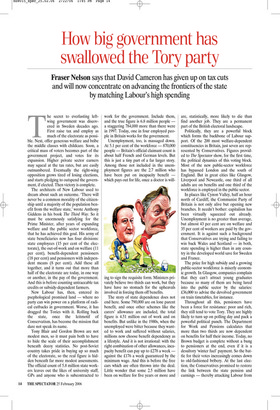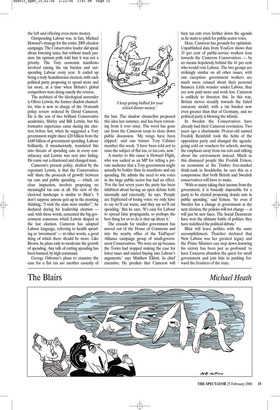How big government has swallowed the Tory party
Fraser Nelson says that David Cameron has given up on tax cuts and will now concentrate on advancing the frontiers of the state by matching Labour’s high spending The secret to everlasting leftwing government was discovered in Sweden decades ago. First raise tax and employ as much of the electorate as possible. Next, offer generous welfare and bribe the middle classes with childcare. Soon, a critical mass of voters becomes part of the government project, and votes for its expansion. Higher private sector earners may squeal at the tax rates, but are easily outnumbered. Eventually the right-wing opposition grows tired of losing elections, and starts pledging to outspend the government, if elected. Then victory is complete.
The architects of New Labour used to dream about such an outcome. ‘There will never be a common morality of the citizenship until a majority of the population benefit from the welfare state,’ wrote Anthony Giddens in his book The Third Way. So it must be enormously satisfying for the Prime Minister, after years of expanding welfare and the public sector workforce, that he has achieved this goal. His army of state beneficiaries now has four divisions: state employees (15 per cent of the electorate), the out-of-work and on welfare (11 per cent), benefit-dependent pensioners (18 per cent) and pensioners with independent means (8 per cent). Add these all together, and it turns out that more than half of the electorate are today, in one way or another, in the pay of the government. And this is before counting untraceable tax credits or subsidy-dependent farmers.
New Labour has, then, entered its psephological promised land — where no party can win power on a platform of radical cutbacks in government. Worse, it has dragged the Tories with it. Rolling back the state, once the leitmotif of Conservatism, has become the mission that dare not speak its name.
Tony Blair and Gordon Brown are not modest men, so it must pain both to have to hide the scale of their accomplishment beneath decoy statistics. No post-Soviet country takes pride in buying up so much of the electorate, so the real figure is hidden beneath far more modest assessments. The official count of 5.8 million state workers leaves out the likes of university staff, GPs and anyone who is subcontracted to work for the government. Include them, and the true figure is 6.8 million people a staggering 784,000 more than there were in 1997. Today, one in four employed people in Britain works for the government.
Unemployment, too, is massaged down. At 5.1 per cent of the workforce — 870,000 people — Britain’s official claimant count is about half French and German levels. But this is just a tiny part of a far larger story. Among those not included in the unemployment figures are the 2.7 million who have been put on incapacity benefit which pays out for life, once a doctor is will ing to sign the requisite form. Ministers privately believe two thirds can work, but they have have no stomach for the upheavals involved in forcing them off benefits.
The story of state dependence does not end here. Some 790,000 are on lone parent benefit, and once other schemes like the carers’ allowance are included, the total figure is 4.51 million out of work and on benefits. But unlike in the 1980s, when the unemployed were bitter because they wanted to work and suffered without salaries, millions now choose benefit dependency as a lifestyle. And it is not irrational: with the right combination of other allowances, incapacity benefit can pay up to £278 a week against the £176 a week guaranteed by the minimum wage. And this is before the free cars which are often thrown into the deal. Little wonder that some 2.5 million have been on welfare for five years or more and are, statistically, more likely to die than find another job. They are a permanent part of the British electoral landscape.
Politically, they are a powerful block which forms the backbone of Labour support. Of the 200 most welfare-dependent constituencies in Britain, just seven are represented by Conservatives. Figures provided to The Spectator show, for the first time, the political dynamics of this voting block. Most of the new public-sector workforce has bypassed London and the south of England. But in great cities like Glasgow, Liverpool and Newcastle, one third of all adults are on benefits and one third of the workforce is employed in the public sector.
In places like Cynon Valley, half an hour north of Cardiff, the Communist Party of Britain is not only alive but opening new branches. It needn’t bother: capitalism has been virtually squeezed out already. Unemployment is no greater than average, but almost 43 per cent are on welfare and 35 per cent of workers are paid by the government. It is against such a background that Conservatives are trying and failing to win back Wales and Scotland — in both, state spending is higher than in any country in the developed world save for Sweden and France.
The price for high subsidy and a growing public-sector workforce is miserly economic growth. In Glasgow, companies complain that they can’t attract young graduates because so many of them are being lured into the public sector by the salaries: £36,000 to advise the devolved government on train timetables, for instance.
Throughout all this, pensioners have been a force for resistance: poor and rich, they still tend to vote Tory. They are highly likely to turn up on polling day and pack a powerful political punch. The Department for Work and Pensions calculates that more than two thirds are now dependent on benefits for half their income. Today, no Brown budget is complete without a bung to pensioners at the end, even if it is a desultory ‘winter fuel’ payment. So the battle for their votes increasingly comes down to old-fashioned bribery. At the last election, the Conservatives promised to restore the link between the state pension and earnings — thereby attacking Labour from the left and offering even more money.
Outspending Labour was, in fact, Michael Howard’s strategy for the entire 2005 election campaign. The Conservative leader did speak about lowering taxes, but without much passion: his opinion polls told him it was not a priority. The Tory economic manifesto involved raising the tax burden and outspending Labour every year. It ended up being a truly Scandinavian election, with each political party proposing to spend more and tax more, at a time when Britain’s global competitors were doing exactly the reverse.
The architect of the ideological surrender is Oliver Letwin, the former shadow chancellor, who is now in charge of the 18-month policy review ordered by David Cameron. He is the son of two brilliant Conservative academics, Shirley and Bill Letwin, but his formative experience came during the election before last, when he suggested a Tory government might shave £20 billion from the £440 billion of government spending. Labour brilliantly, if mendaciously, translated this into threats of spending cuts in every constituency and Letwin was sent into hiding. He came out a chastened and changed man.
Cameron’s present policy, drafted by the repentant Letwin, is that the Conservatives will ‘share the proceeds of growth’ between tax cuts and public spending — which, on close inspection, involves proposing no meaningful tax cuts at all. His view of the electoral landscape is similar to Blair’s. ‘I don’t suppose anyone gets up in the morning thinking, “I wish the state were smaller”,’ he declared during his leadership election and, with those words, cemented the big-government consensus which Letwin shaped at the last election. Cameron has adopted Labour language, referring to health spending as ‘investment’ — in other words, a good thing of which there should be more. Like Brown, he plans only to moderate the growth of spending. Any talk of cutting spending has been banned, by high command.
George Osborne’s plans to examine the case for a flat tax are another casualty of the ban. The shadow chancellor proposed this idea last summer, and has been retreating from it ever since. The word has gone out from the Cameron team to close down public discussion. ‘My wings have been clipped,’ said one former Tory Cabinet member this week. ‘I have been told not to raise the subject of flat tax, or tax cuts, now.’ A martyr to this cause is Howard Flight, who was sacked as an MP for telling a private audience that a Tory government might actually be bolder than its manifesto and cut spending. He admits the need to win votes in the huge public sector has had an effect. ‘For the last seven years the party has been inhibited about having an open debate both internally and externally,’ he says. ‘People are frightened of losing votes: we only have to say we’ll cut waste, and they say we’ll cut spending.’ But he says, ‘It’s easy for Labour to spread false propaganda, so perhaps the best thing for us to do is shut up about it.’ The crusade for smaller government has moved out of the House of Commons and into the nearby office of the TaxPayers’ Alliance campaign group of small-government Conservatives. ‘We were set up because the Tories had stopped making the case for lower taxes and started buying into Labour’s arguments,’ says Matthew Elliott, its chief executive. He predicts that Cameron will bury tax cuts even further down the agenda as he starts to pitch for public-sector votes.
Here, Cameron has grounds for optimism. Unpublished data from YouGov shows that 35 per cent of public-service workers lean towards the Cameron Conservatives — by no means hopelessly behind the 41 per cent who would vote Labour. The two groups are strikingly similar on all other issues, with one exception: government workers are much more relaxed about their personal finances. Little wonder: under Labour, they are now paid more and work less. Cameron is unlikely to threaten this. In this way, Britain moves steadily towards the failed eurozone model, with a tax burden now even greater than that of Germany, and no political party is blowing the whistle.
In Sweden the Conservatives have already had their Cameron revolution. Two years ago a charismatic 39-year-old named Fredrik Reinfeldt took the helm of the opposition party and changed the agenda: going cold on vouchers for schools, moving the emphasis away from tax cuts and talking about the environment instead. Much as this dismayed people like Fredrik Erixon, an economist at the Timbro free-market think-tank in Stockholm, he sees this as a compromise that both British and Swedish conservatives will have to make.
‘With so many taking their income from the government, it is basically impossible for a party to be elected proposing drastic cuts in public spending,’ said Erixon. ‘So even if Sweden has a change in government at the next election, the policies will not change — it will just be new faces. The Social Democrats have won the ultimate battle of politics: they have redefined the political debate.’ Blair will leave politics with the same accomplishment. Thatcher declared that New Labour was her greatest legacy and the Prime Minister can step down knowing his victory has been just as profound: to have Cameron abandon the quest for small government and join him in pushing forward the frontiers of the state.



































































 Previous page
Previous page